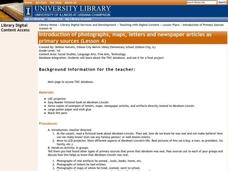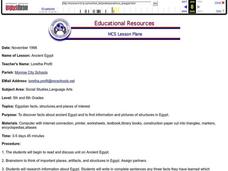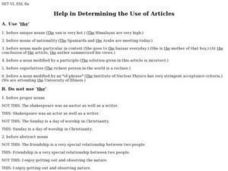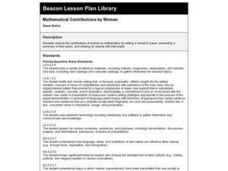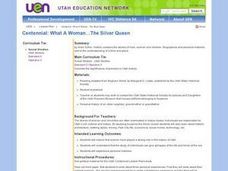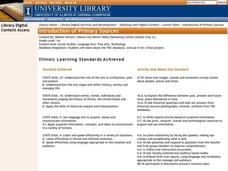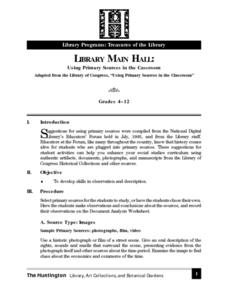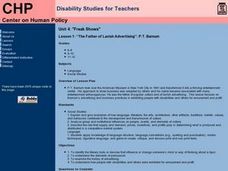Curated OER
Introduction of Primary Sources
First graders are introduced to photographs and newspaper articles to be used as primary sources. Using a projecter, they are shown photographs of a famous person to prove they were real and not make believe. In groups, they use...
Curated OER
Ancient Egypt
Young scholars discover facts about ancient Egypt and find information and pictures of structures in Egypt. They write a story using as many hieroglyphic symbols as possible. Stories are made into a display on bulletin board.
Curated OER
What Death Brings to Life - English Component
Pupils are introduced to the characteristics of ancient Indian, Chinese and Aztec cultures. They consider what was valued by these cultures and compare the cultures' values to their own. They write an essay on their reflections.
Curated OER
Class Celebration of Primary Sources (Lesson 6)
First graders participate in a celebration to end their examination on primary sources. In teams, they guide special guests around their classroom to show what they have done with primary sources. They share their peronal primary...
Curated OER
The Use of Articles Resource Page
In this use of articles resource worksheet, students receive help in determining the proper use of articles in their writing. They read about the proper use of the, a, and an.
Curated OER
Deerfield Debates Its Future: Education
Students consider the effect of technological development, industrial growth and changing population on education in historical Deerfield Connecticut. They review many primary resources to investigate history and write a response to...
Curated OER
African Masks (Pre-Visit)
Second graders observe and describe several masks from different parts of Africa housed in the Smithsonian Institute (National Museum of African Art) Washington, D.C. They use the internet to view the Smithsonian's virtual exhibits.
Curated OER
Mathematical Contributions By Women
Third graders explore the contributions of women to mathematics by writing a research paper, presenting a summary to their peers, and sharing an activity with their peers. They use a variety of reference materials to gather information...
Curated OER
What A Woman...The Silver Queen
Fourth graders realize that women have played a strong role in the history of Utah. They explain that the study of individuals can give glimpses of the life and times of the era. They experience their personal histories.
Curated OER
Virtual Ellis Island Museum Unit: Oral Histories
Young scholars conduct oral histories of family members to explore their cultural and ethnic heritage after developing a set of research questions.
Curated OER
Using Scholastic News to Introduce the Net
Third graders log on to the net, type in the address for Scholastic and browse the subjects for the week. They select one area of interest and generate five interesting facts about the article.
Curated OER
Rikki-Tikki Research
Fourth graders perform a search on mongooses on Internet Explorer and answer research questions.
Curated OER
Yaba "Data" Cereal
Fifth graders create and modify a database using information from cereal labels.
Curated OER
Desegregating the Kentucky Public School System
Students watch a video which chronicles the struggle to desegregate Kentucky's schools. They write a paper on a given aspect of what they saw in the video.
Curated OER
Introduction of Primary Sources
First graders examine a database to explain the use of primary source documents.
Curated OER
Plants for Pleasure and Profit
Young scholars study about some of the specimens collected or diagrammed by Lewis and Clark, discuss their usefulness, and rank their importance. They write a persuasive essay detailing the plants they thought the most important.
Curated OER
Mapping the West
Learners determine how Americans' perception of the geographical features of the West changed following the Lewis and Clark expedition. They analyze historical maps of the West.
Curated OER
Carbondale: The Biography of a Coal Town
Students use a brief history of the growth and decline of the anthracite region in the state to create a photograph and map "peak shaped" time line. They practice map and photo analysis strategies to "read" photographs and maps.
Curated OER
September 12 Journal Writing
Students write journal entries reflecting on their feelings about the attacks of September 11, 2001.
Curated OER
Writing Places American Communities
Students interview a member of the community and write a piece of poetry using the voice of the interviewee.
Curated OER
Library Main Hall: Using Primary Sources in the Classroom
Students choose a historical photograph or film and try to predict what happened after the photo or film in question.
Curated OER
Lesson 1: The Image of Maine in Sinclair Lewis' Babbitt
Students study excerpts from Sinclair Lewis, "Babbitt" for its accuracy and socio-economic point of view. They rewrite a portion of "Babbit" using the point of view of a Maine guide.
Curated OER
Oh, Give Them a Home!
Fourth graders study the habitat of the American bison and its role in the life of the Native Americans. They investigate how the bison effect the Lewis and Clark expedition.
Curated OER
"The Father of Lavish Advertising": P.T. Barnum
Students examine the life and work of P.T. Barnum. They discover his advertising techniques and business practices. They examine his use of people with disabilities for amusement.
Other popular searches
- Inca Artifacts
- Cultural Artifacts
- Archeology Artifacts
- Indian Artifacts
- Artifacts and Archeology
- Native American Artifacts
- Ancient Cultures Artifacts
- Historical Artifacts
- American Artifacts
- Ancient Chinese Artifacts
- Egyptian Artifacts
- Chicago Artifacts


